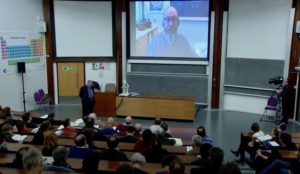
active information


New Papers Explore the Utility of Active Information
![Photo: A leafy sea dragon, by Sylke Rohrlach from Sydney [CC BY-SA 2.0], via Wikimedia Commons.](https://scienceandculture.com/wp-content/uploads/2019/05/1280px-Leafy_Sea_Dragon-Phycodurus_eques_23694746864-300x168.jpg)
Robert Marks on Evolution and Creativity

The Law of Zero Magic

On Protein Design, Don’t Be Fooled by Biochemist David Baker’s Claim

For Beleaguered Computer Simulations of Evolution, Can Co-Evolution Save the Day?

William Dembski and Robert Marks Publish (Another) Peer-Reviewed Scientific Paper Supporting No Free Lunch Theorems
A peer-reviewed scientific paper published in 2010 by William Dembski and Robert Marks of the Evolutionary Informatics Lab supports no free lunch theorems. Published in Journal of Advanced Computational Intelligence and Intelligent Informatics and titled “The Search for a Search: Measuring the Information Cost of Higher Level Search,” the paper’s abstract states that unless one has information about a target, search engines often fail: “Needle-in-the-haystack problems look for small targets in large spaces. In such cases, blind search stands no hope of success.” Their principle of Conservation of Information holds that “any search technique will work, on average, as well as blind search.” However, in such a case “[s]uccess requires an assisted search. But whence the assistance required for a Read More ›

Winston Ewert, William Dembski, and Robert Marks Publish Mainstream Scientific Paper Exposing Flaws in Avida Evolution Simulation






































